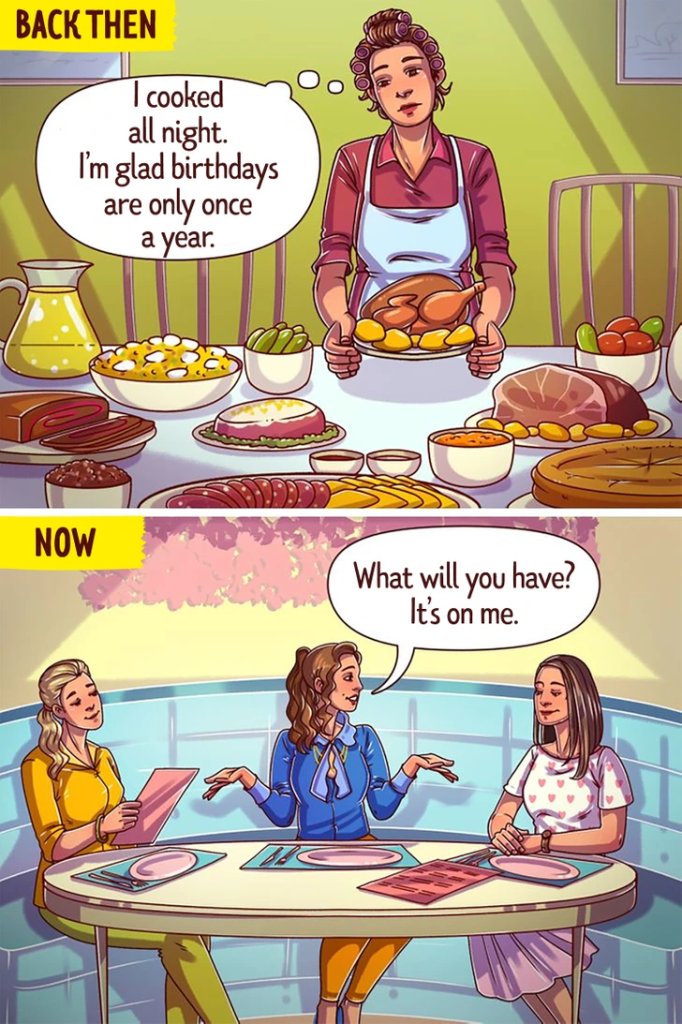Times change, and so do social norms. What was once frowned upon or considered rude is now widely accepted—or even encouraged. Society evolves, and with it, our understanding of personal boundaries, etiquette, and lifestyle choices. Let’s take a look at some things that were once taboo but are now completely normal.
You Don’t Have to Invite Everyone Over to Be a Good Host

There was a time when being a gracious host meant opening your doors to all your friends, family, and even distant acquaintances. If you threw a party, everyone had to be included. But today? Not so much.
People respect personal space and understand that hosting is a choice, not an obligation. Whether it’s a small gathering or a solo night in, the definition of hospitality has shifted. It’s more about quality connections rather than appeasing everyone.
Personal Boundaries Matter More Than Pleasing Others
Gone are the days when saying “yes” to everything was a sign of politeness. Setting personal boundaries is now recognized as an essential part of mental well-being.
Whether it’s declining an invite, choosing to spend time alone, or standing firm on your decisions, people today understand that boundaries aren’t selfish—they’re necessary. Prioritizing yourself is no longer seen as rude but as a sign of self-respect.
Finishing the Last Slice of Pizza? Go for It!
In the past, leaving the last slice of pizza (or the last piece of food on a shared plate) was considered polite. It was a silent rule: “Don’t take the last piece unless someone insists.” But now? Forget that!
Food isn’t meant to be wasted, and if you’re hungry, go ahead and take it. Most people would rather see food enjoyed than thrown away. Plus, with the rise of mindful eating and sustainability, leaving food behind just for the sake of etiquette seems outdated.
We Demand Better Service Without Feeling Guilty
Years ago, customers hesitated to complain about bad service, fearing they’d be labeled as rude or demanding. But today, people recognize that good service is a standard, not a privilege.
Whether it’s returning an unsatisfactory product, giving feedback to a business, or speaking up when service falls short, people now understand that their voice matters. Companies, in turn, have adapted, realizing that customer feedback helps them improve.
Leaving Tips Is No Longer Mandatory—It’s a Choice
Tipping was once an unspoken rule, no matter how good or bad the service was. Even if your waiter barely acknowledged your presence, you were still expected to tip.
Today, tipping is seen as a sign of gratitude for excellent service, not an obligation. Many people now base their tips on the quality of service rather than social pressure. In some places, service charges are already included, making tipping optional rather than expected.
Women Can Make the First Move—And No One Thinks Twice About It

Traditionally, men were expected to take the lead in dating—asking a woman out, planning the first date, and making the first move. But times have changed.
Today, women making the first move is not just accepted—it’s encouraged. Whether it’s sending the first message on a dating app or initiating a relationship, the old-fashioned idea that men have to take charge is fading fast.
Imperfections Aren’t Something to Hide Anymore
There was a time when everyone tried to present a flawless version of themselves—physically, emotionally, and socially. People hid their insecurities, covered up their imperfections, and strived for an impossible standard.
Now, embracing flaws is the new norm. From unfiltered selfies to honest conversations about mental health, people are more comfortable showing their true selves. Authenticity is valued far more than perfection.
No One Cares What You Wear to the Theater Anymore
Going to a theater once meant dressing up in formal attire—suits, ties, dresses, and fancy shoes. It was an event, and looking your best was part of the experience.
Today? Not so much. While some people still enjoy dressing up, it’s no longer required. Casual wear is perfectly acceptable, and what matters most is your love for the performance, not your outfit.
Seniors Aren’t Always Right—And That’s Okay
“Respect your elders” used to mean never questioning what they said, even if they were clearly wrong. But today, people recognize that respect goes both ways.
Age doesn’t automatically make someone correct, and younger generations aren’t afraid to challenge outdated views. While respecting older family members is still important, blind obedience is no longer expected. Discussions are more open, and opinions are exchanged rather than forced.
Perfection Is Overrated—You Don’t Have to Always Look Flawless

Social media and real-life expectations once made people feel pressured to look perfect all the time. Every outing required effort, and leaving the house without looking polished felt unacceptable.
But now? People embrace natural beauty, comfortable clothing, and even “messy” styles. Whether it’s skipping makeup, rocking a laid-back look, or choosing comfort over fashion, perfection is no longer the standard—it’s about feeling good in your own skin.
Saying “No” Is No Longer a Crime
Avoiding offense used to be a top priority, even if it meant agreeing to things you didn’t want to do. Declining an invitation or saying “no” to someone’s request was often seen as rude.
Today, people understand that saying “no” is a necessary part of life. Whether it’s protecting your time, energy, or emotions, refusing something doesn’t mean you’re rude—it means you’re prioritizing yourself.
Some Social Rules Are Just Outdated Stereotypes
Many so-called “rules of propriety” were never really necessary—they were just traditions passed down without question. From strict gender roles to etiquette rules that made no practical sense, society has moved on.
Now, people feel freer to question outdated norms and challenge unnecessary expectations. Traditions are evolving, and what truly matters is comfort, respect, and authenticity.
Final Thoughts: The World Keeps Changing, and That’s a Good Thing
What was once unacceptable is now perfectly normal. Society constantly evolves, and as we grow, we learn that many of the old rules were just societal constructs that didn’t always make sense. Today, we prioritize self-care, respect, and personal happiness over rigid expectations. And honestly? That’s progress.